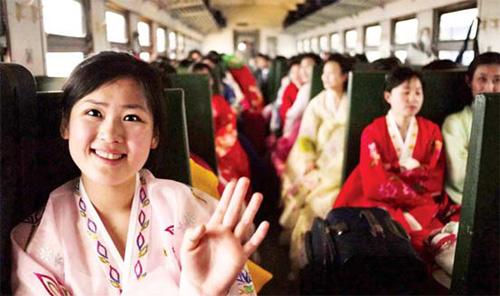 Members of a Democratic People s Republic of Korea song and dance troupe onboard a train that arrived at the border town of Dandong, Liaoning province, on Sunday. They will present a remake of the Chinese classic A Dream of Red Mansions in Beijing from Thursday to Sunday. [China Daily] |
But neither the Foreign Ministry nor the International Liaison Department of the Communist Party of China confirmed the visit on Monday, a public holiday in China.
|
||||
"We received a notice from the Public Security Bureau and the army that we should shut down tourist operations in the morning," the official said on telephone, AFP reported.
The Associated Press reported a 17-car train believed to be carrying Kim pulled into Dandong early on Monday.
The train then headed to the port city of Dalian, Yonhap news agency of the Republic of Korea (ROK) said. A convoy of 15 limousines was seen arriving at the five-star Furama Hotel in the city center, the report said, citing unidentified sources in Dandong and Beijing.
A Furama staff member told China Daily in the afternoon that "an event" was taking place and the hotel was not accepting bookings.
The hotel covered its facade in a billowing white sheet as part of security measures, and to keep out prying reporters, Reuters said.
Heavy police presence could be seen in the car park and near the hotel, and receptionists at the hotel refused to comment when contacted by AFP.
A switchboard operator at the hotel told AP that security had been tightened but she would not say whether Kim was expected.
A highway to Dalian was blocked to normal traffic and there was a heavy police guard near a factory zone, Reuters reported.
There was no mention of Kim's trip in the DPRK state media, which typically reports on his journeys after he returns home.
ROK broadcaster YTN aired blurry footage of a man in sunglasses outside the hotel with an entourage, and identified him as Kim.
Japan's Kyodo News agency, citing unidentified sources knowledgeable about China-DPRK relations, also said Kim and his party were seen at the swanky hotel.
There were reports earlier this year about Kim's visit to China but none proved true.
If confirmed this time, it would be Kim's first trip in more than four years to China. He visited in 2000, 2001, 2004 and 2006.
Analysts said if the visit materializes, talks on the Korean Peninsula nuclear issue as well as economic cooperation will top the agenda.
"Kim will likely express his commitment to returning to the Six-Party Talks while leaving a date for the return up to China, the host," Yang Moo-jin of Seoul's University of North Korean Studies told AFP.
Zhang Liangui, an expert on Korean affairs at the Central Party School in Beijing, agreed.
"Bringing the DPRK back to the Six-Party Talks should be the most important issue," he said.
The DPRK quit the nuclear disarmament talks in April last year, and conducted a nuclear test in May, which led to tightened UN sanctions.
Liu Jiangyong, a senior scholar on Asia-Pacific studies at Tsinghua University, said Kim's visit "will have a positive effect on the restarting of the Six-Party Talks".
"China will actively urge the DPRK to come back to the negotiating table."
But he cautioned there is no clear indication that the talks will resume after Kim's visit given the recent tensions on the peninsula.
The ROK suspects the DPRK attacked one of its naval ships in late March, killing 46 of its sailors, but Seoul has not directly blamed Pyongyang for the sinking of the warship, Reuters reported.
Pyongyang has denied any involvement.
The DPRK earlier set two preconditions for returning to the nuclear talks - the UN lift sanctions and the US sign a peace treaty with the DPRK to formally end the more than half-century state of war.
But Zhang said the conditions are unlikely to be met.
"The situation is more complex now. Washington is likely to take a much firmer stance. After the global nuclear summit in Washington last month, non-proliferation of nuclear materials has been given more priority," he said.
A UN conference opens this week to review the Nuclear Nonproliferation Treaty and explore ways to strengthen controls on the spread of nuclear materials.
In March, China's special envoy for Korean Peninsula affairs Wu Dawei told China Daily that Beijing expected the stalled nuclear talks to resume before July.
Related News
Photos
More>>trade
market
- China and ESAC Exchange Experience on Satellite Instrument Calibration and
- IMHE, TU Strength Cooperation
- Sino-American Expedition Produced a New Coelurosaurian Theropod in Xinjiang,
- SCBG and Maruzen Pharm Sign Contract for Licorice Research
- IVPP Professor Elected Foreign Member of the Royal Swedish Academy of Sciences

 Chinese army official meets delegation heading for DPRK visit
Chinese army official meets delegation heading for DPRK visit



